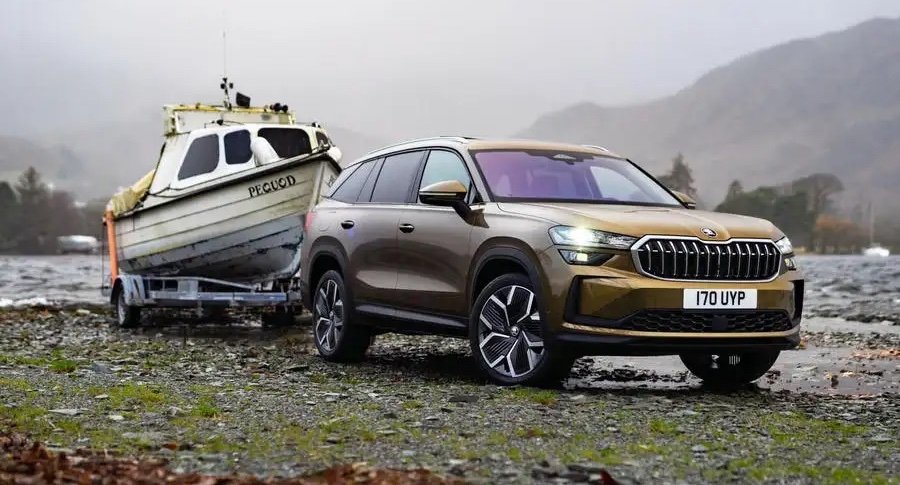Skoda Kodiaq PHEV brings 75-mile electric range for £41,935

Order books for the plug-in hybrid Skoda Kodiaq iV have opened in the UK, with the new family SUV offering an electric range of 75 miles for £41,935.
Its powertrain pairs a 148bhp turbocharged four-cylinder petrol engine with a gearbox-mounted 114bhp electric motor, which combine to put out up to 204bhp and 258lb ft.
Its battery has a capacity of 25.7kWh (19.7kWh of which is usable) to give a range of 75 miles between charges. It can be replenished at up to 50kW on a DC rapid charger.
The entry-level plug-in hybrid is £5290 more than the comparable petrol model (£36,645), which uses the same engine but with 48V mild-hybrid assistance.
That base price is for the Kodiaq SE, which has 18in wheels and comes with LED lights, heated front seats and keyless start.
Mid-rung SE L, meanwhile, bumps the price up to £40,205 and adds 19in wheels, matrix headlights, an electrically adjustable driver's seat and leather upholstery.
A new range-topping high-spec Sportline variant will be added to the roster later this year, raising the price nearer to £45,000.
The hot Kodiaq vRS is tipped to return later on, with four-wheel drive and nearly 300bhp.
Deliveries are scheduled to begin imminently.
The Czech brand's reinvented flagship is the first production car to be styled with elements from the 'Modern Solid' philosophy previewed by the Vision 7S concept, which gives the new Kodiaq a more overtly rugged and utilitarian billing than its predecessor.
Highlights of the refresh include squared-off wheel arches, a prominent hexagonal grille, a heavily sculpted bonnet and model badging in a new corporate font.
The makeover is capped off by Skoda's clean new logo, which makes its first appearance on a production car. Also new for the 2024 Kodiaq is the option of an LED light strip running across the front end, which brings it into line with its electric Enyaq sibling.
Skoda head of design Oliver Stefani said the second-generation SUV has been designed according to the principle of 'form follows function', adding: "The design not only emphasises practicality but also enhances the aerodynamics with its dynamic shape."
In fact, the blocky new look belies the "major aerodynamic advancements" achieved via the sloping roofline, active cooling shutters, sleek new mirrors, a chunky rear wing and cleaner-lined bumpers. Skoda claims a drag coefficient of 0.282 for the new car.
The design overhaul accompanies a "moderate but effective" increase in overall dimensions. Measuring 61mm longer than its predecessor and with a wheelbase of 2791mm, the new Kodiaq offers more space for each passenger while boosting load capacity in the boot.
Skoda claims passengers in the optional third row of seats now have an increased, 920mm of head room, and even behind the rearmost seats, luggage capacity is pegged at 340 litres - a 70-litre increase. The five-seat car benefits from a 75-litre boost to offer 910 litres with the rear seats in place.
Meanwhile, the cockpit area – revealed last month and largely shared with the new Skoda Superb – plays host to a redesigned control suite that majors on tidiness and ease of use. There is a 10.0in digital gauge cluster, an optional head-up display and a new free-standing touchscreen – measuring either 10.0in or 13.0in – for control of most vehicle functions. However, Skoda points to three new physical 'smart dials' ahead of the centre console as the headline introduction for the new Kodiaq's cabin.
The outer two rotary knobs, each housing a 32mm colour display, are used to adjust the full suite of climate controls for the driver and passenger, while the middle one can be configured to control the infotainment volume, driving modes, map zoom or air conditioning.
The interior can be specified in one of four simple 'design selection' packages – Loft, Lounge and two variations of sustainability-themed Ecosuite – and each has been conceived with an eye on reducing the Kodiaq's environmental footprint.
There is no chrome in the new SUV's interior, for example, and all textiles are said to be made from either 100% recycled polyester or 40% natural wool. Even the included ice scraper and umbrella – hallmarks of the Skoda line-up – are "made from sustainable materials".
Pure-combustion engines return in the form of two turbocharged four-cylinder diesels or petrols, with outputs ranging between 148bhp and 201bhp and each paired to a seven-speed dual-clutch automatic gearbox.
The entry-level 1.5-litre petrol engine, driving the front wheels, is equipped with 48V mild-hybrid technology – another first for the Kodiaq – and cylinder-deactivation technology for reduced consumption while cruising. Skoda has yet to reveal any official MPG or emissions figures, however.
The more potent 2.0-litre petrol and 2.0-litre diesel engines drive through a seven-speed gearbox, and the most powerful of each comes as standard with four-wheel drive. There is no word yet on plans for a hot Kodiaq vRS range-topper, but notably the closely related Tiguan is available with a 261bhp 4WD PHEV powertrain, which could feasibly be deployed in the new Kodiaq.
For the time being, the Kodiaq range is topped by the performance-inspired Sportline, which is marked out by its black exterior and interior trim elements, colour-coded lower bodywork and bespoke alloy wheel designs.
It comes as standard with a raft of equipment that's optional further down the line-up, including the Kodiaq's new Dynamic Chassis Control (DCC) suspension control package, which features twin-valve dampers for improved dynamics and refinement, and has a wide range of available suspension modes.
